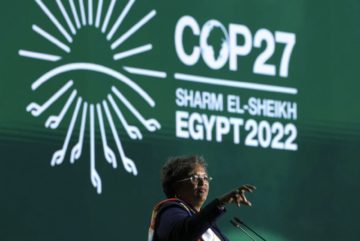 Mona Ali , Anna Gelpern, Avinash Persaud, Rishikesh Ram Bhandary, Brad Setser, and Adam Tooze in Phenomenal World’s The Polycrisis:
Mona Ali , Anna Gelpern, Avinash Persaud, Rishikesh Ram Bhandary, Brad Setser, and Adam Tooze in Phenomenal World’s The Polycrisis:
The conclusion of COP27 reflected persisting uncertainties around coordinated global action towards decarbonization. Major agreements—including the establishment of a loss and damage fund—were reached, but the burden of mounting debt among global South countries continued to limit climate ambition.
The second event convened by The Polycrisis begins with COP27 and tackles the larger constraints in the global financial system, the role of private finance and multilateral development banks, the possibilities of debt restructuring, and new avenues to rethink climate finance. The discussion featured Mona Ali, Rishikesh Ram Bhandary, Anna Gelpern, Avinash Persaud, and Brad Setser, and was moderated by Adam Tooze.
A recording of the event can be viewed here. This transcript has been lightly edited for length and clarity.
A conversation on climate and the global financial architecture
ADAM TOOZE: It seems to me that there are four key issues for us to discuss. The first is the question of sovereign debt restructuring. Looming over that is the role of private finance in addressing development issues, and climate finance issues in particular. Then there is the role of multinational financial institutions: the World Bank and the IMF. But the obvious place to start is with COP27, and where we’re at now.
Avinash, from your point of view, where do things stand, particularly with the Bridgetown Initiative? You and Barbados Prime Minister Mia Mottley have developed this clearly formulated program for a route out of the impasse we find ourselves in.
More here.
